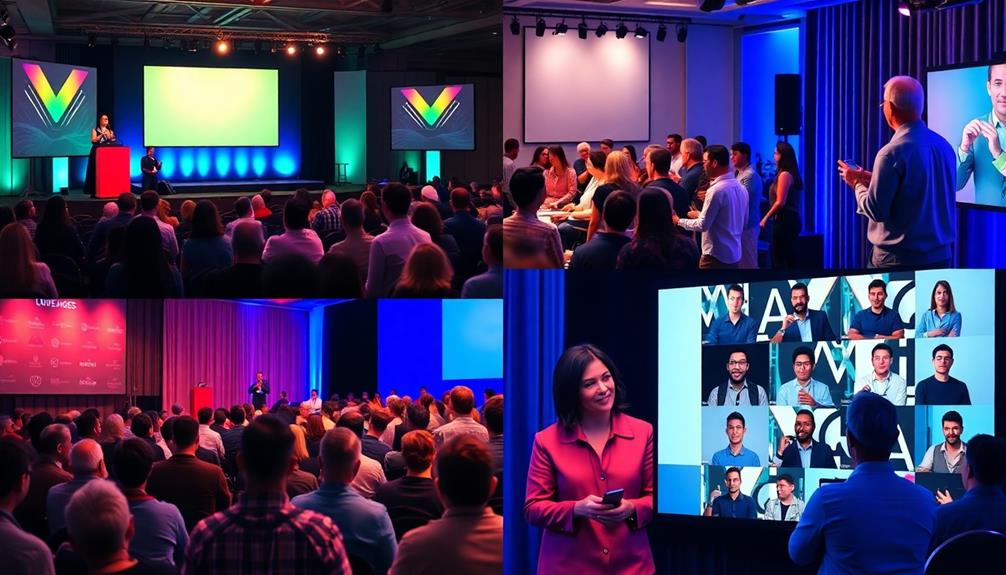To land your first paid speaking gig, start by understanding your audience. Identify their interests and align your message with event goals. Next, craft a compelling pitch that showcases your expertise and unique value. Build a strong personal brand with a professional online presence and consistent messaging. Explore speaking opportunities by targeting suitable events and using online platforms. Gain experience through free talks to hone your skills and make valuable connections. Finally, negotiate your fees confidently, presenting your value and justifying your rates. Keep going, and you'll uncover more strategies to elevate your speaking career.
Key Takeaways
- Identify your target audience by researching their demographics and interests to tailor your message effectively.
- Craft a compelling pitch that highlights your expertise and defines your speaking offerings, focusing on building relationships.
- Build a strong personal brand with a professional online presence, showcasing your speaking experience and testimonials.
- Explore speaking opportunities through targeted events, online platforms, and networking with event organizers.
- Gain experience with free talks to refine your skills, build a portfolio, and establish connections for future paid gigs.
Understanding Your Audience

When you understand your audience, you set the stage for a successful speaking engagement. Identifying your target audience is vital; it involves researching their demographics, interests, and needs. This guarantees your message resonates and adds real value to their experience.
For instance, if you're speaking to tech enthusiasts, you might reference recent developments like Microsoft's global service outage to illustrate challenges in technology. By considering the specific problems or challenges they face, you can greatly enhance the relevance and impact of your presentation.
Engage with your audience on social media and online platforms before the event. This interaction allows you to gather insights on their preferences and expectations for your speaking engagements. Conduct surveys or polls to pinpoint the topics that genuinely interest them. This information will guide your content and presentation style, making them more appealing and effective.
Additionally, tailor your message to align with the goals and mission of the event organizers. This approach not only helps you connect with the audience but also increases your chances of securing future speaking opportunities.
Crafting Your Compelling Pitch

Crafting a compelling pitch is essential for landing your first paid speaking gig. Start by clearly defining your speaking offerings, such as keynotes or workshops, so you can tailor your pitch to the needs of potential clients. Your introductory pitch should highlight your expertise and align with the interests of your target audience.
To engage potential clients further, consider utilizing inviting strategies, like proposing roundtable discussions or interactive sessions. This fosters a collaborative atmosphere that encourages client participation. When reaching out, focus on establishing a connection rather than selling your services outright; this can lead to fruitful follow-up conversations.
Expect to pitch to multiple clients before securing a paid speaking engagement. Use feedback to refine your pitch and remember that persistence is key, as initial rejections are common.
Here's a simple table to visualize your pitching elements:
| Element | Description | Purpose |
|---|---|---|
| Speaking Offerings | Keynotes, Workshops | Tailor to client needs |
| Introductory Pitch | Highlight expertise | Engage and align with audience |
| Engagement Strategy | Roundtables, Interactive sessions | Foster collaboration |
| Follow-Up Approach | Build connections, not just sales | Encourage future conversations |
Building Your Personal Brand

To successfully land your first paid speaking gig, building a strong personal brand is essential. Start by clearly defining your unique value proposition. This will help guarantee that your brand resonates with the needs and interests of your target audience.
A solid personal brand can also enhance your financial stability, similar to how credit cards play a significant role in personal finance stability. Here are some key steps to take:
- Create a professional website showcasing your speaking experience, including a portfolio of past engagements and testimonials.
- Utilize social media, especially LinkedIn, to connect with industry leaders and share relevant content that highlights your expertise.
- Develop consistent messaging across all platforms, enhancing your recognition and credibility as a thought leader in your niche.
Engaging in content creation, like blogs or videos, can further establish your authority and attract paid engagements. The more you share valuable insights, the more potential clients will see you as a go-to expert.
Exploring Speaking Opportunities

To find your first paid speaking gig, you need to identify target events that match your expertise.
Start by utilizing online platforms like Eventbrite and Meetup to uncover potential opportunities.
Additionally, examining successful startup stories can provide inspiration and insights into how others have navigated similar paths.
Networking with event organizers can also open doors, so don't hesitate to reach out and build those connections.
Identifying Target Events
Finding the right events to speak at is essential for launching your speaking career. Identifying target events that align with your expertise and interests can set you on the path to getting paid to speak. Start by exploring local and virtual opportunities through platforms like Eventbrite and Meetup. You'll find a wealth of possibilities that can lead to paid speaking gigs.
Consider these strategies to pinpoint ideal events:
- Research industry-specific conferences and workshops on social media and community boards.
- Monitor hashtags like #speakingopportunities and #conference to stay updated on potential engagements.
- Join professional organizations like Toastmasters to network and access exclusive speaking opportunities.
Create a list of potential events, focusing on audience demographics and key takeaways. This guarantees your topics resonate with attendees, increasing your chances of landing paid speaking gigs.
Utilizing Online Platforms
A multitude of online platforms can greatly enhance your search for speaking opportunities. Start by utilizing platforms like Eventbrite and Meetup to discover both local and virtual events that match your expertise. These sites often list gatherings where speakers are needed, so keep an eye on them regularly.
Joining professional organizations, such as Toastmasters, can also be beneficial. They provide access to member-exclusive events and networking opportunities that might lead to your next speaking gig.
Don't underestimate the power of social media, especially LinkedIn. Use it to promote your speaking skills and connect with event organizers actively seeking speakers for their occasions.
Additionally, monitoring event-specific hashtags on Twitter and Instagram can help you identify upcoming conferences and workshops where you can propose your services.
Lastly, consider creating a profile on speaker directories like GigSalad or SpeakerHub. These platforms increase your visibility and connect you with event planners looking for speakers in your niche.
Networking With Organizers
Building genuine relationships with event organizers can be the key to opening your first paid speaking gig. Networking isn't just about exchanging business cards; it's about creating connections that lead to speaking opportunities.
Start by attending industry conferences and networking events where you can meet these organizers face-to-face.
- Engage on social media: Share insights and express interest in their upcoming events to establish rapport.
- Craft personalized pitches: Align your speaking topics with the event's themes, showing you understand their audience's needs.
- Utilize LinkedIn: Identify and connect with decision-makers in your target organizations, aiming for a list of at least 100 potential clients.
After your initial contact, don't forget to follow up. Express gratitude for their time and offer insights on how your expertise can enhance their events.
This reinforces your interest and showcases your fit for future engagements. By actively engaging with event organizers and demonstrating your value, you'll increase your chances of landing that all-important first paid speaking gig.
Gaining Experience Through Free Talks

Gaining experience through free talks can be a game changer for aspiring speakers. When you speak at local events and conferences without charging a fee, you refine your messaging and presentation skills while boosting your confidence.
These free speaking opportunities allow you to build a portfolio that showcases your expertise, making it easier to attract paid gigs down the line. They also provide a chance to refine your presentation skills and gain confidence in front of an audience. As you build a speaking portfolio, you can leverage it to demonstrate your value to event organizers and secure more prestigious engagements. Over time, this portfolio becomes a powerful tool for establishing credibility and standing out in your niche.
Moreover, engaging in free talks opens up networking avenues with potential clients and event organizers. They often remember speakers who left a positive impression, which may lead to future paid opportunities.
As you gain exposure through these engagements, your visibility and credibility within your industry will grow, setting a solid foundation for your speaking career.
Don't forget to collect testimonials and media content from your free engagements. These endorsements can greatly enhance your speaker profile, making it more appealing to future paying clients.
By leveraging the experiences and connections you gain from free talks, you'll position yourself as a credible speaker ready for paid opportunities.
Negotiating Your Speaking Fees

When it comes to negotiating your speaking fees, research industry standards to find a solid starting point.
You should also be ready to justify your rates by highlighting your value and audience impact.
Additionally, consider a tiered pricing strategy to attract a wider range of clients and events.
Research Industry Standards
To effectively negotiate your speaking fees, start by researching the average rates in your specific industry or niche. Established speakers often earn between £10,000 and £30,000, while newcomers can charge realistically between £500 and £1,500 for their initial engagements. Understanding these research industry standards will help you position yourself effectively.
Consider the following when determining your fees:
- Event Size: Large conferences may have bigger budgets, allowing for higher rates.
- Audience Type: Specialized audiences may value your expertise more, justifying elevated fees.
- Online Opportunities: Virtual events often reduce costs, enabling you to command similar fees without travel.
Also, remember that high-profile speakers can demand over £100,000 for a single keynote. This illustrates the potential earnings as you build your reputation in professional speaking.
Be prepared to present evidence of your experience and the value you bring to event organizers. Offering tiered pricing based on event size can provide flexibility while ensuring you maintain minimum acceptable rates.
Regularly review and adjust your speaking fees based on feedback and demand, especially as online speaking opportunities increase.
Justify Your Value
Justifying your value as a speaker is essential for successful negotiations. When you're landing your first paid speaking gig, you'll want to charge between £500 and £1,500, depending on your experience and the specifics of the event.
To justify your value, showcase your expertise, experience, and the results you can deliver to your audience. If you've worked with a speaking coach, mention this to highlight your commitment to professional development.
Research average speaker fees within your niche to understand the market. This will help you set competitive pricing and validate your value during negotiations. Be prepared to negotiate, but establish a minimum acceptable rate to guarantee your time and expertise are adequately compensated.
Communicate the unique benefits you bring to the table, whether it's a fresh perspective or specialized knowledge. As you negotiate, remember that confidence in your worth can greatly impact the outcome.
Articulate your value clearly, and don't shy away from discussing your fees. By doing this, you not only set a precedent for your future engagements but also reinforce your professional standing in the industry.
Tiered Pricing Strategy
Establishing a tiered pricing strategy can greatly enhance your negotiation power when discussing speaking fees. By offering different packages based on audience size and event type, you create flexibility that caters to a broader range of clients. This approach not only attracts different budgets but also showcases your adaptability as a speaker.
Consider these package options:
- Basic Package: Ideal for smaller events with fewer attendees.
- Standard Package: Perfect for mid-sized gatherings, offering additional content or engagement.
- Premium Package: Tailored for large audiences, including exclusive Q&A sessions or workshops.
As you set your prices, it's essential to establish a minimum acceptable rate. This guarantees you're compensated fairly for your time and expertise, especially while building your reputation.
Research average speaker fees in your industry to position yourself competitively. For new speakers, charging between £500 and £1,500 is realistic, while higher-profile speakers can go as high as £30,000.
Justify your fee with evidence from past engagements and testimonials. By presenting your worth clearly, you enhance your negotiating stance and help clients understand the value you bring.
Frequently Asked Questions
How to Land Your First Paid Speaking Gig?
To land your first paid speaking gig, identify a niche that fits your expertise, build a strong online presence, network with potential clients, and practice a compelling pitch while considering free engagements for experience.
How to Book Your First Speaking Gig?
To book your first speaking gig, identify your niche and target audience. Craft a strong speaker bio, network actively, and reach out to event planners. Consider offering free talks to gain experience and credibility.
How to Get Paid for Speaking Gigs?
Imagine planting seeds in a garden; nurture your expertise and reputation, then watch opportunities bloom. Showcase your skills, network effectively, and create tailored pitches—this is how you'll get paid for your speaking gigs.
How Do You Start Public Speaking for Beginners?
To start public speaking, identify your niche, join groups like Toastmasters for feedback, practice in front of varied audiences, create a portfolio, and promote yourself on social media. Confidence builds with experience, so immerse yourself!
Conclusion
As you step into the world of paid speaking, remember that each opportunity could lead to your breakthrough moment. You've crafted your pitch, built your brand, and gained invaluable experience. But the real thrill lies in what's next. Will you seize the chance to share your passion with an enthusiastic audience? Picture the applause and the connections waiting for you. Take a deep breath, trust yourself, and get ready—your first paid speaking gig is just around the corner.









